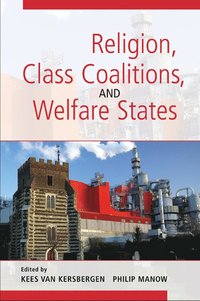
- Format
- Häftad (Paperback)
- Språk
- Engelska
- Antal sidor
- 320
- Utgivningsdatum
- 2009-04-06
- Förlag
- Cambridge University Press
- Medarbetare
- Manow, Philip
- Illustrationer
- 1 line figure 4 tables
- Volymtitel
- Religion, Class Coalitions, and Welfare States
- Dimensioner
- 226 x 150 x 23 mm
- Vikt
- Antal komponenter
- 1
- Komponenter
- 2:B&W 6 x 9 in or 229 x 152 mm Perfect Bound on Creme w/Gloss Lam
- ISBN
- 9780521723954
- 431 g
Religion, Class Coalitions, and Welfare States
- Skickas från oss inom 7-10 vardagar.
- Fri frakt över 249 kr för privatkunder i Sverige.
Passar bra ihop
De som köpt den här boken har ofta också köpt Don't Believe Everything You Think av Joseph Nguyen (häftad).
Köp båda 2 för 549 krKundrecensioner
Fler böcker av Kees Van Kersbergen
-
Social Capitalism
Kees Van Kersbergen
-
Comparative Welfare State Politics
Kees Van Kersbergen
-
The Politics of Inequality
Carsten Jensen, Kees Van Kersbergen
-
Expansion and Fragmentation
Kees Van Kersbergen, Robert H Lieshout, Grahame Lock
Recensioner i media
"Religion, Class Coalitions, and Welfare States is the most authoritative work so far on the impact of religion on welfare state development. It provides us with both a grand theoretical perspective and hugely rich analysis of how Protestantism and Catholicism meshed with politics and class in the evolution of social policies in Europe and America. This book has no rivals and is unlikely to have any for some time to come. It will have a tremendous impact on welfare state research in the coming years. This is historical and comparative social science at its very best, and Van Kersbergen and Manow deserve our thanks for putting it all together."
-Gsta Esping-Andersen, Universitat Pompeu Fabra, Barcelona
"If you think you know everything about class coalitions and social policies, think again. Kees van Kersbergen and Philip Manow's brilliant edited volume starts with the best recent work in political economy and pushes the cutting edge deep into history and contemporary policy debates. The book explains the origins and trajectories of different varieties of welfare states and traces out the roles that religion and conflicts over religion have played in the politics and political economies of advanced industrial societies. Scholars in economics, history, political science, policy studies, political economy, religion, and sociology will enjoy reading ten crisp chapters. Invite the contributors over to dinner at your own risk-they all know how to talk about politics, religion, and economics."
-Andrew C. Gould, University of Notre Dame
"This is a brilliant volume, which compels wide attention in the field of comparative politics, political economy, social policy, the welfare state and religion. It constructs a coherent account of the origins of the welfare state which integrates religious and economic cleavages, electoral rules and political institutions, in a historically grounded, theoretically tight manner. It challenges previous theories while moving the argument forward. A great book, a must read!"
-Peter Gourevitch, University of California, San Diego
"This book is an intellectual tour de force on the role of religion in the development of the modern welfare state. The editors outline an entirely new approach to the field, and the individual chapters offer a goldmine of historical research. It will become a standard reference for anyone interested in political parties and in European social, economic and political history."
-Torben Iversen, Harvard University
"This superb and highly integrated edited volume will be a central reference point for work on the role of religion in the political construction and evolution of the welfare state and more generally comparative political economy. It contains six excellent country chapters with serious historical depth. And it is structured analytically around the coalitions which Christian democratic and social democratic parties have been able to...
Övrig information
Kees van Kersbergen is a Professor of Political Science at VU University Amsterdam. He served as director of the Centre for Comparative Social Studies until 2007 and has also been professor of political science at the Radboud University (Nijmegen). He is the author of Social Capitalism (1995), which won the Stein Rokkan Prize in Comparative Social Science, and co-editor of Expansion and Fragmentation: Internationalization, Political Change and the Transformation of the Nation State (2014). Philip Manow is a Professor of Political Science at the University of Konstanz. Previously, he was a researcher at the Max-Planck Institute for the Study of Societies, Cologne, and visiting fellow at the Centre for European Studies, Harvard, and at the Centre d'tudes Europennes, Sciences Po, Paris. His work has been published in numberous journals and collections, including European Journal of Political Research, West European Politics, Comparative Political Studies, The New Politics of the Welfare State (2001), and Federalism and the Welfare State (2008).
Innehållsförteckning
1. Religion and the Western welfare state: the theoretical context Philip Manow and Kees van Kersbergen; 2. Western European party systems and the religious cleavage Thomas Ertman; 3. The religious foundations of work-family policies in Western Europe Kimberly J. Morgan; 4. Italy: a Christian democratic or clientist welfare state? Julia Lynch; 5. Religion and the welfare state in the Netherlands Kees van Kersbergen; 6. A conservative welfare state regime without Christian Democracy? The French Etat-providence, 1880-1960 Philip Manow and Bruno Palier; 7. Religion and the consolidation of the Swiss welfare state, 1848-1945 Herbert Obinger; 8. The church as nation? The role of religion in the development of the Swedish welfare state Karen M. Anderson; 9. The religious factor in US welfare state politics Jill Quadagno and Deanna Rohlinger; 10. Religious social doctrines and poor relief: a different causal pathway Sigrun Kahl.


